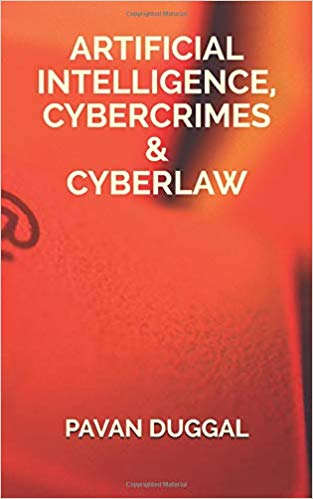About the Book
ARTIFICIAL INTELLIGENCE, CYBERCRIMES & CYBERLAW
As Artificial Intelligence gains more attraction, the scenario of its misuse for cybercrime purposes is increasingly becoming an issue of important concern. Initially, it was thought that Artificial Intelligence ecosystem would be secured but with the new trends and developments emerging, it is apparent that Artificial Intelligence enabled cybercrime is going to be massive in the coming times.
Already at the time of writing, an Artificial Intelligence program has developed malware which is a highly sophisticated and it promises to immensely and detrimentally impact computer systems. At the time of writing the concept of Artificial Intelligence cybercrime is indeed very nascent. Most of the Artificial Intelligence stakeholders are not even alive to the fact that how the Artificial Intelligence ecosystem could be misused for cybercrime purposes. However, there is an increasing growing area of intersection between Artificial Intelligence cybercrime and Cyberlaw.
Hence, there is an absolute need for coming up with appropriate and effective cyber legal jurisprudential frameworks to deal with Artificial Intelligence cybercrime. There are different various crimes and categories of Artificial Intelligence cybercrime that are already currently being envisaged. There is a huge possibility that new crimes of Artificial Intelligence cybercrime would further evolve in the coming times. This book seeks to look at some of the important legal, policy and regulatory issues in the intersection between Artificial Intelligence and cybercrime and how legal frameworks need to evolve in this direction.
This book also seeks to identify some of the practical challenges that are likely to come before stakeholders in the detection, investigation and prosecution of Artificial Intelligence cybercrimes.
Further, the applicability of traditional legal concepts of criminal law jurisprudence to Artificial Intelligence crimes begins to throw up new challenges. This book has not only sought to examine how existing legal frameworks apply to Artificial Intelligence cybercrime but also why there is a need for coming up with new, innovative and customized approaches in existing cyber criminal jurisprudence in terms of their applicability to Artificial Intelligence enabled cybercrime.
I have written this book in a layman’s language. This book basically deals with the intersection of Artificial Intelligence cybercrime and cyberlaw. At the time of writing lot of the content of this book may appear to be very futuristic. But, given the rapid developments in Artificial Intelligence, it is only question of time before these issues and aspects become more pertinent and topical and would increasingly demand attention from the relevant stakeholders.
I hope this book would be of relevance to every stakeholder in the Artificial Intelligence ecosystem who is interested in the secure working of Artificial Intelligence and who is concerned that the Artificial Intelligence misuse should not be targeted for criminal purposes. I wish the readers of this book happy reading. This eBook would be of relevance to not just lawyers, legal professionals, lawyers, judges, academicians, nation states, governments but also other stakeholders, who are keen to watch the growth and evolution in the Artificial Intelligence ecosystem.
This eBook is authored by Pavan Duggal (http://www.pavanduggal.com), internationally renowned and acclaimed foremost expert on Cyber Security Law and Cyberlaw, who has been acknowledged as one of the top four cyber lawyers of the world. This eBook’s Author runs his niche law firm Pavan Duggal Associates, Advocates (http://pavanduggalassociates.com/ ) which is working on all aspects concerning technology and the law.
© Pavan Duggal, 2018
Order Now
Preview
Disclosure of Material Connection: Some of the links in the page above are "affiliate links." This means if you click on the link and purchase the item, I will receive an affiliate commission. I am disclosing this in accordance with the Federal Trade Commission's 16 CFR, Part 255: "Guides Concerning the Use of Endorsements and Testimonials in Advertising."

